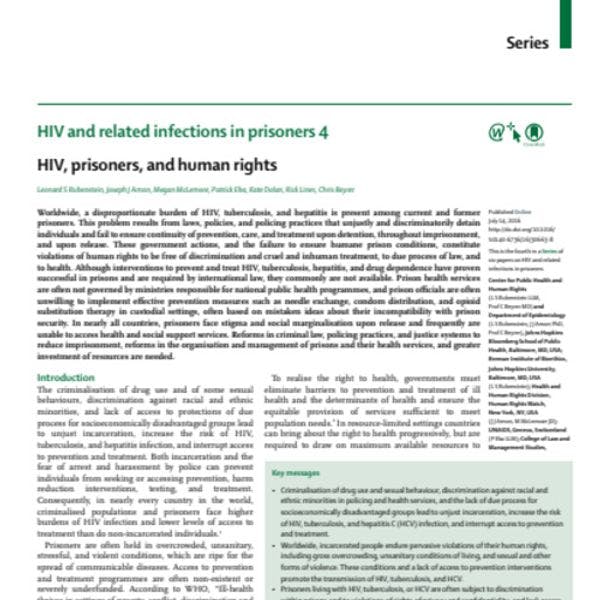HIV, prisoners, and human rights
Worldwide, a disproportionate burden of HIV, tuberculosis, and hepatitis is present among current and former prisoners. This problem results from laws, policies, and policing practices that unjustly and discriminatorily detain individuals and fail to ensure continuity of prevention, care, and treatment upon detention, throughout imprisonment, and upon release. These government actions, and the failure to ensure humane prison conditions, constitute violations of human rights to be free of discrimination and cruel and inhuman treatment, to due process of law, and to health. Although interventions to prevent and treat HIV, tuberculosis, hepatitis, and drug dependence have proven successful in prisons and are required by international law, they commonly are not available. Prison health services are often not governed by ministries responsible for national public health programmes, and prison offi cials are often unwilling to implement eff ective prevention measures such as needle exchange, condom distribution, and opioid substitution therapy in custodial settings, often based on mistaken ideas about their incompatibility with prison security. In nearly all countries, prisoners face stigma and social marginalisation upon release and frequently are unable to access health and social support services. Reforms in criminal law, policing practices, and justice systems to reduce imprisonment, reforms in the organisation and management of prisons and their health services, and greater investment of resources are needed.
The criminalisation of drug use and of some sexual behaviours, discrimination against racial and ethnic minorities, and lack of access to protections of due process for socioeconomically disadvantaged groups lead to unjust incarceration, increase the risk of HIV, tuberculosis, and hepatitis infection, and interrupt access to prevention and treatment. Both incarceration and the fear of arrest and harassment by police can prevent individuals from seeking or accessing prevention, harm reduction interventions, testing, and treatment. Consequently, in nearly every country in the world, criminalised populations and prisoners face higher burdens of HIV infection and lower levels of access to treatment than do non-incarcerated individuals.
Prisoners are often held in overcrowded, unsanitary, stressful, and violent conditions, which are ripe for the spread of communicable diseases. Access to prevention and treatment programmes are often non-existent or severely underfunded. According to WHO, “Ill-health thrives in settings of poverty, confl ict, discrimination and disinterest. Prison is an environment that concentrates precisely these issues.”2 Continuity of treatment during imprisonment and upon release is rare.
Keep up-to-date with drug policy developments by subscribing to the IDPC Monthly Alert.
Downloads
Topics
Regions
Related Profiles
- The Lancet
